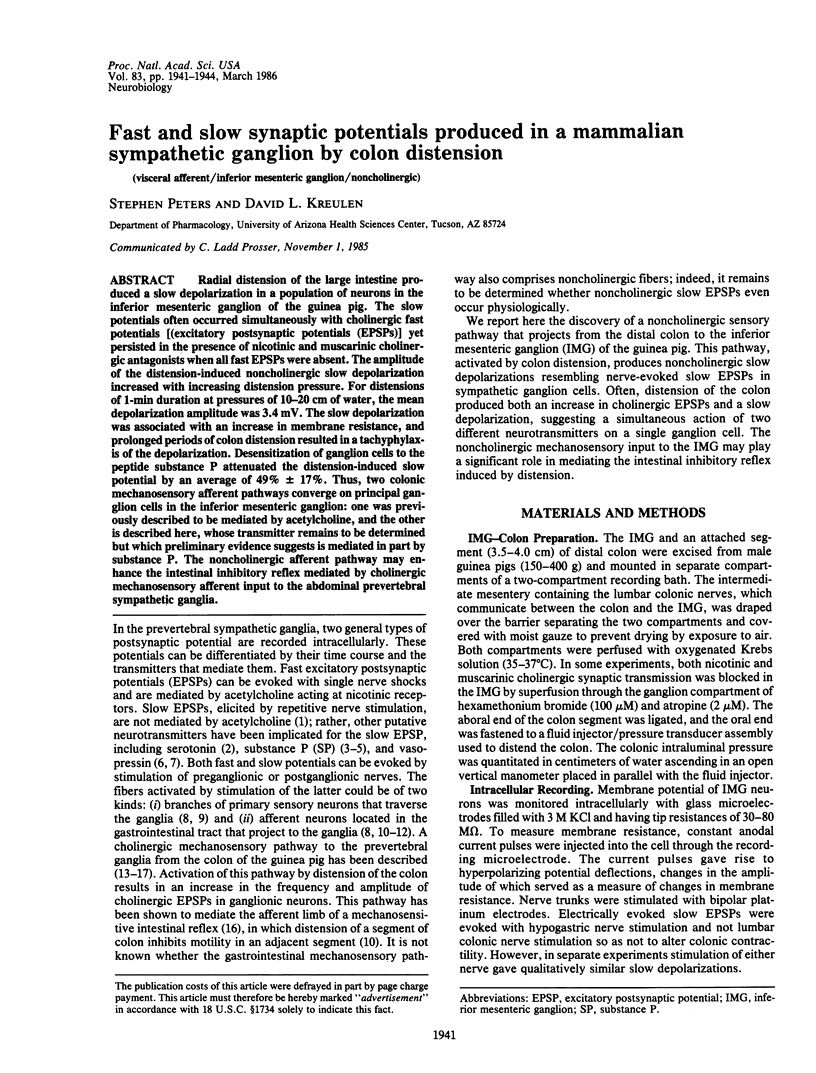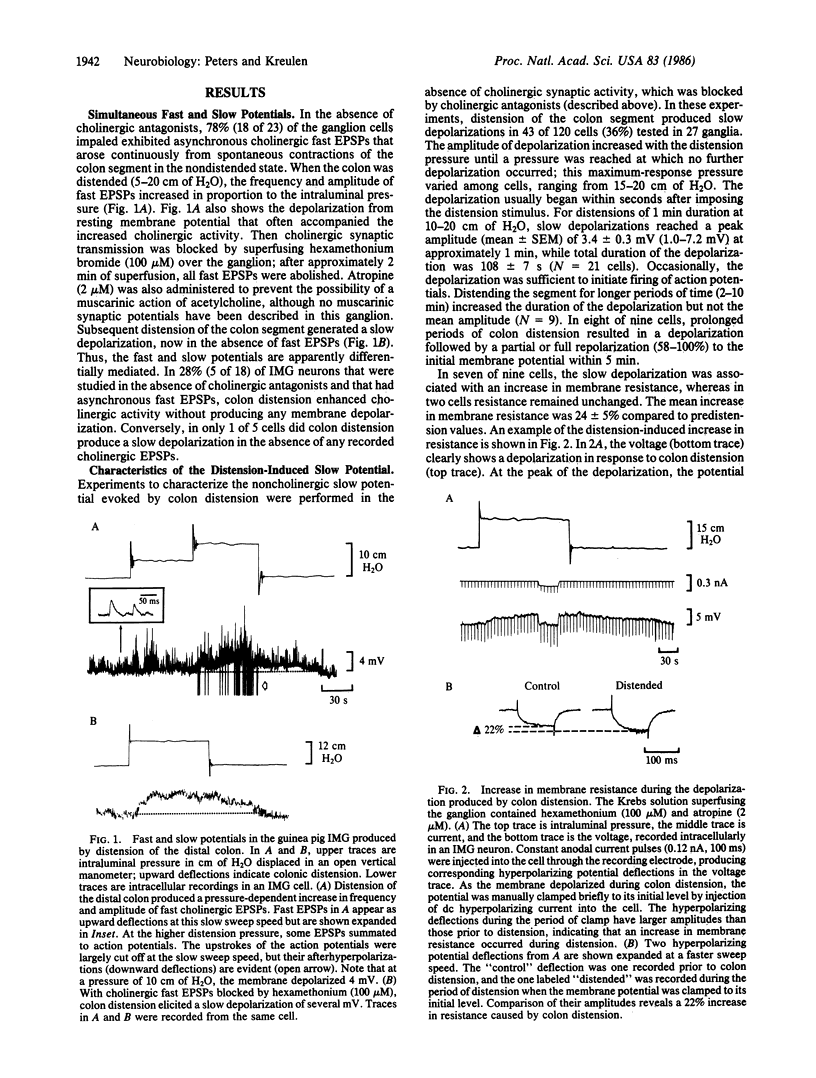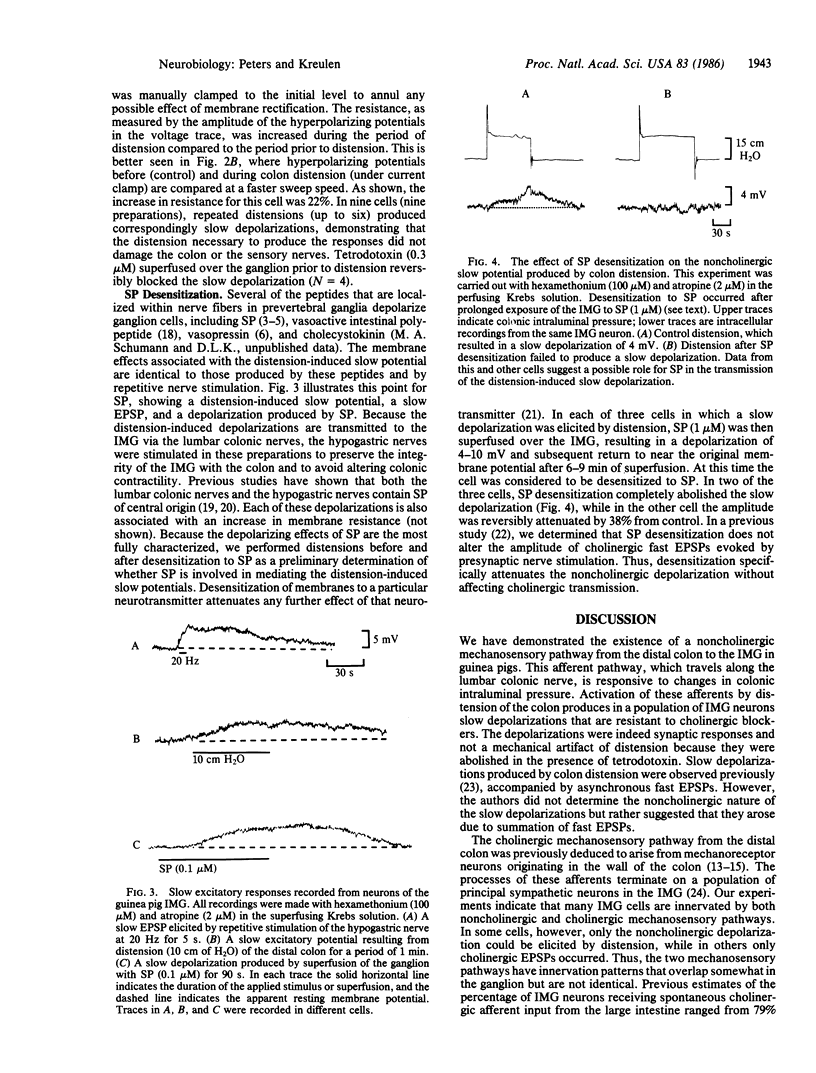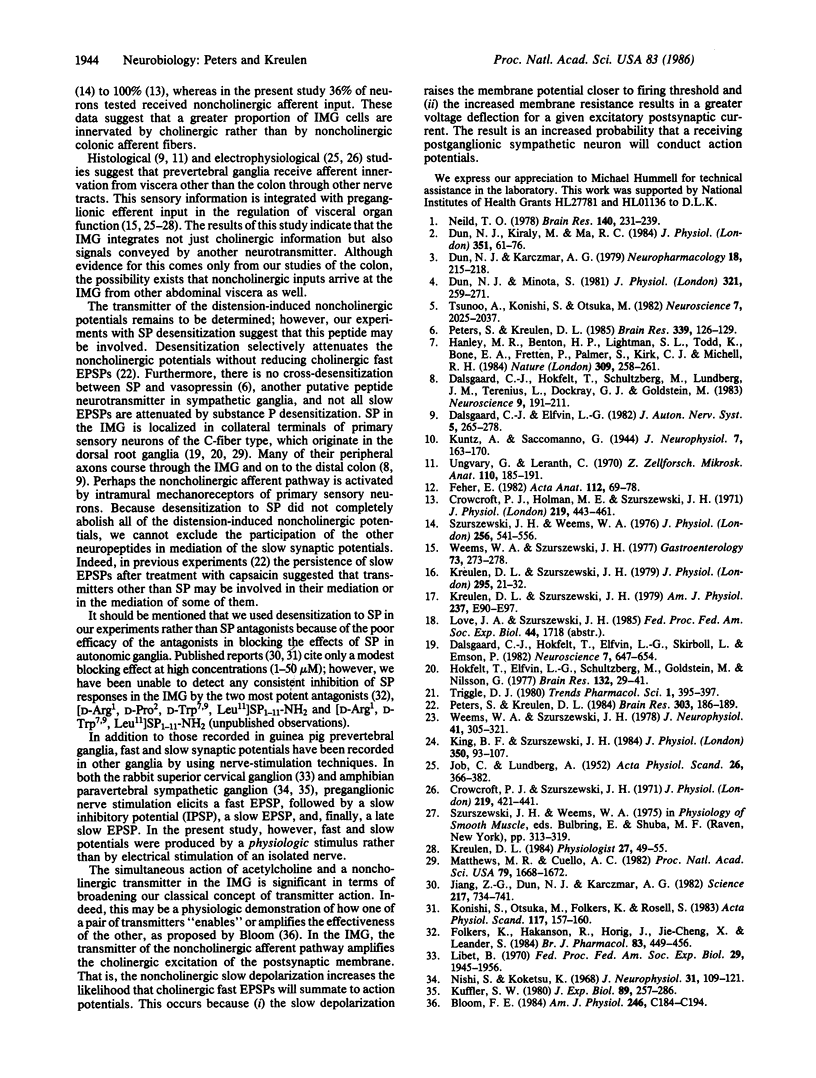Abstract
Radial distension of the large intestine produced a slow depolarization in a population of neurons in the inferior mesenteric ganglion of the guinea pig. The slow potentials often occurred simultaneously with cholinergic fast potentials [( excitatory postsynaptic potentials (EPSPs]) yet persisted in the presence of nicotinic and muscarinic cholinergic antagonists when all fast EPSPs were absent. The amplitude of the distension-induced noncholinergic slow depolarization increased with increasing distension pressure. For distensions of 1-min duration at pressures of 10-20 cm of water, the mean depolarization amplitude was 3.4 mV. The slow depolarization was associated with an increase in membrane resistance, and prolonged periods of colon distension resulted in a tachyphylaxis of the depolarization. Desensitization of ganglion cells to the peptide substance P attenuated the distension-induced slow potential by an average of 49% +/- 17%. Thus, two colonic mechanosensory afferent pathways converge on principal ganglion cells in the inferior mesenteric ganglion: one was previously described to be mediated by acetylcholine, and the other is described here, whose transmitter remains to be determined but which preliminary evidence suggests is mediated in part by substance P. The noncholinergic afferent pathway may enhance the intestinal inhibitory reflex mediated by cholinergic mechanosensory afferent input to the abdominal prevertebral sympathetic ganglia.
Full text
PDF



Selected References
These references are in PubMed. This may not be the complete list of references from this article.
- Bloom F. E. The functional significance of neurotransmitter diversity. Am J Physiol. 1984 Mar;246(3 Pt 1):C184–C194. doi: 10.1152/ajpcell.1984.246.3.C184. [DOI] [PubMed] [Google Scholar]
- Crowcroft P. J., Holman M. E., Szurszewski J. H. Excitatory input from the distal colon to the inferior mesenteric ganglion in the guinea-pig. J Physiol. 1971 Dec;219(2):443–461. doi: 10.1113/jphysiol.1971.sp009671. [DOI] [PMC free article] [PubMed] [Google Scholar]
- Crowcroft P. J., Szurszewski J. H. A study of the inferior mesenteric and pelvic ganglia of guinea-pigs with intracellular electrodes. J Physiol. 1971 Dec;219(2):421–441. doi: 10.1113/jphysiol.1971.sp009670. [DOI] [PMC free article] [PubMed] [Google Scholar]
- Dalsgaard C. J., Elfvin L. G. Structural studies on the connectivity of the inferior mesenteric ganglion of the guinea pig. J Auton Nerv Syst. 1982 May;5(3):265–278. doi: 10.1016/0165-1838(82)90070-4. [DOI] [PubMed] [Google Scholar]
- Dalsgaard C. J., Hökfelt T., Elfvin L. G., Skirboll L., Emson P. Substance P-containing primary sensory neurons projecting to the inferior mesenteric ganglion: evidence from combined retrograde tracing and immunohistochemistry. Neuroscience. 1982 Mar;7(3):647–654. doi: 10.1016/0306-4522(82)90070-7. [DOI] [PubMed] [Google Scholar]
- Dalsgaard C. J., Hökfelt T., Schultzberg M., Lundberg J. M., Terenius L., Dockray G. J., Goldstein M. Origin of peptide-containing fibers in the inferior mesenteric ganglion of the guinea-pig: immunohistochemical studies with antisera to substance P, enkephalin, vasoactive intestinal polypeptide, cholecystokinin and bombesin. Neuroscience. 1983 May;9(1):191–211. doi: 10.1016/0306-4522(83)90056-8. [DOI] [PubMed] [Google Scholar]
- Dun N. J., Karczmar A. G. Actions of substance P on sympathetic neurons. Neuropharmacology. 1979 Feb;18(2):215–218. doi: 10.1016/0028-3908(79)90064-9. [DOI] [PubMed] [Google Scholar]
- Dun N. J., Kiraly M., Ma R. C. Evidence for a serotonin-mediated slow excitatory potential in the guinea-pig coeliac ganglia. J Physiol. 1984 Jun;351:61–76. doi: 10.1113/jphysiol.1984.sp015232. [DOI] [PMC free article] [PubMed] [Google Scholar]
- Dun N. J., Minota S. Effects of substance P on neurones of the inferior mesenteric ganglia of the guinea-pig. J Physiol. 1981 Dec;321:259–271. doi: 10.1113/jphysiol.1981.sp013982. [DOI] [PMC free article] [PubMed] [Google Scholar]
- Fehér E. Electron microscopic study of retrograde axonal transport of horseradish peroxidase in the wall of the small intestine in the cat. Acta Anat (Basel) 1982;112(1):69–78. [PubMed] [Google Scholar]
- Folkers K., Håkanson R., Hörig J., Xu J. C., Leander S. Biological evaluation of substance P antagonists. Br J Pharmacol. 1984 Oct;83(2):449–456. doi: 10.1111/j.1476-5381.1984.tb16506.x. [DOI] [PMC free article] [PubMed] [Google Scholar]
- Hanley M. R., Benton H. P., Lightman S. L., Todd K., Bone E. A., Fretten P., Palmer S., Kirk C. J., Michell R. H. A vasopressin-like peptide in the mammalian sympathetic nervous system. Nature. 1984 May 17;309(5965):258–261. doi: 10.1038/309258a0. [DOI] [PubMed] [Google Scholar]
- Hökfelt T., Elfvin L. G., Schultzberg M., Goldstein M., Nilsson G. On the occurrence of substance P-containing fibers in sympathetic ganglia: immunohistochemical evidence. Brain Res. 1977 Aug 19;132(1):29–41. doi: 10.1016/0006-8993(77)90704-1. [DOI] [PubMed] [Google Scholar]
- JOB C., LUNDBERG A. Reflex excitation of cells in the inferior mesenteric ganglion on stimulation of the hypogastric nerve. Acta Physiol Scand. 1952;26(4):366–382. doi: 10.1111/j.1748-1716.1952.tb00918.x. [DOI] [PubMed] [Google Scholar]
- Jiang Z., Dun N. J., Karczmar A. G. Substance P: a putative sensory transmitter in mammalian autonomic ganglia. Science. 1982 Aug 20;217(4561):739–741. doi: 10.1126/science.6179162. [DOI] [PubMed] [Google Scholar]
- King B. F., Szurszewski J. H. Mechanoreceptor pathways from the distal colon to the autonomic nervous system in the guinea-pig. J Physiol. 1984 May;350:93–107. doi: 10.1113/jphysiol.1984.sp015190. [DOI] [PMC free article] [PubMed] [Google Scholar]
- Konishi S., Otsuka M., Folkers K., Rosell S. A substance P antagonist blocks non-cholinergic slow excitatory postsynaptic potential in guinea-pig sympathetic ganglia. Acta Physiol Scand. 1983 Jan;117(1):157–160. doi: 10.1111/j.1748-1716.1983.tb07192.x. [DOI] [PubMed] [Google Scholar]
- Kreulen D. L. Integration in autonomic ganglia. Physiologist. 1984 Feb;27(1):49–55. [PubMed] [Google Scholar]
- Kreulen D. L., Szurszewski J. H. Nerve pathways in celiac plexus of the guinea pig. Am J Physiol. 1979 Jul;237(1):E90–E97. doi: 10.1152/ajpendo.1979.237.1.E90. [DOI] [PubMed] [Google Scholar]
- Kreulen D. L., Szurszewski J. H. Reflex pathways in the abdominal prevertebral ganglia: evidence for a colo-colonic inhibitory reflex. J Physiol. 1979 Oct;295:21–32. doi: 10.1113/jphysiol.1979.sp012952. [DOI] [PMC free article] [PubMed] [Google Scholar]
- Kuffler S. W. Slow synaptic responses in autonomic ganglia and the pursuit of a peptidergic transmitter. J Exp Biol. 1980 Dec;89:257–286. doi: 10.1242/jeb.89.1.257. [DOI] [PubMed] [Google Scholar]
- Libet B. Generation of slow inhibitory and excitatory postsynaptic potentials. Fed Proc. 1970 Nov-Dec;29(6):1945–1956. [PubMed] [Google Scholar]
- Matthews M. R., Cuello A. C. Substance P-immunoreactive peripheral branches of sensory neurons innervate guinea pig sympathetic neurons. Proc Natl Acad Sci U S A. 1982 Mar;79(5):1668–1672. doi: 10.1073/pnas.79.5.1668. [DOI] [PMC free article] [PubMed] [Google Scholar]
- Neild T. O. Slowly-developing depolarization of neurones in the guinea-pig inferior mesenteric ganglion following repetitive stimulation of the preganglionic nerves. Brain Res. 1978 Jan 27;140(2):231–239. doi: 10.1016/0006-8993(78)90457-2. [DOI] [PubMed] [Google Scholar]
- Nishi S., Koketsu K. Early and late after discharges of amphibian sympathetic ganglion cells. J Neurophysiol. 1968 Jan;31(1):109–121. doi: 10.1152/jn.1968.31.1.109. [DOI] [PubMed] [Google Scholar]
- Peters S., Kreulen D. L. A slow EPSP in mammalian inferior mesenteric ganglion persists after in vivo capsaicin. Brain Res. 1984 Jun 11;303(1):186–189. doi: 10.1016/0006-8993(84)90227-0. [DOI] [PubMed] [Google Scholar]
- Peters S., Kreulen D. L. Vasopressin-mediated slow EPSPs in a mammalian sympathetic ganglion. Brain Res. 1985 Jul 22;339(1):126–129. doi: 10.1016/0006-8993(85)90630-4. [DOI] [PubMed] [Google Scholar]
- Szurszewski J. H., Weems W. A. A study of peripheral input to and its control by post-ganglionic neurones of the inferior mesenteric ganglion. J Physiol. 1976 Apr;256(3):541–556. doi: 10.1113/jphysiol.1976.sp011338. [DOI] [PMC free article] [PubMed] [Google Scholar]
- Tsunoo A., Konishi S., Otsuka M. Substance P as an excitatory transmitter of primary afferent neurons in guinea-pig sympathetic ganglia. Neuroscience. 1982;7(9):2025–2037. doi: 10.1016/0306-4522(82)90117-8. [DOI] [PubMed] [Google Scholar]
- Ungváry G., Léránth C. Termination in the prevertebral abdominal sympathetic ganglia of axons arising from the local (terminal) vegetative plexus of visceral organs. Peripheral reflex arcs. Z Zellforsch Mikrosk Anat. 1970;110(2):185–191. doi: 10.1007/BF00335524. [DOI] [PubMed] [Google Scholar]
- Weems W. A., Szurszewski J. H. An intracellular analysis of some intrinsic factors controlling neural output from inferior mesenteric ganglion of guinea pigs. J Neurophysiol. 1978 Mar;41(2):305–321. doi: 10.1152/jn.1978.41.2.305. [DOI] [PubMed] [Google Scholar]
- Weems W. A., Szurszewski J. H. Modulation of colonic motility by peripheral neural inputs to neurons of the inferior mesenteric ganglion. Gastroenterology. 1977 Aug;73(2):273–278. [PubMed] [Google Scholar]


